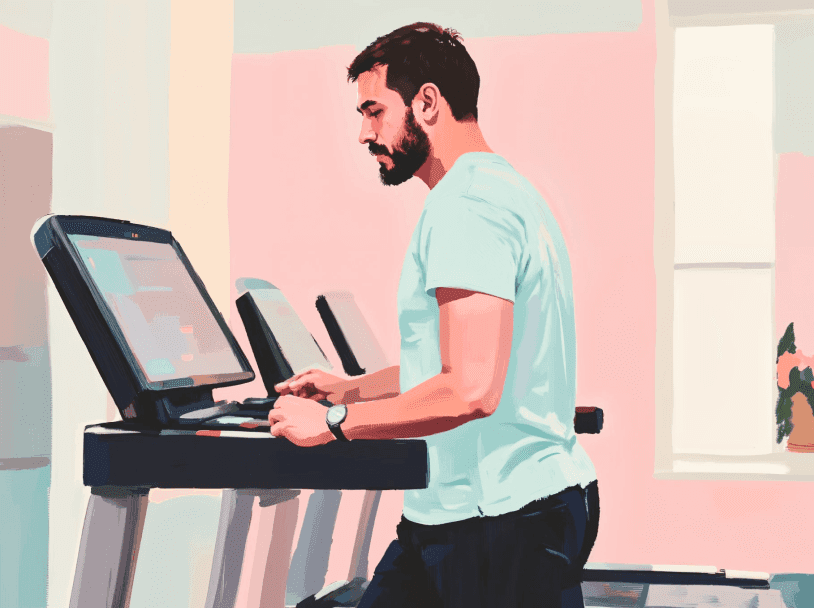
First consultation?

Need a refill?

First consultation?

Need a refill?
How to Boost Your Testosterone : Lifestyle changes and Peptides
Hormone

Leah Bush
•
7 mins read
• Jun 20, 2024
Testosterone is a crucial hormone for men, influencing everything from muscle mass and bone density to mood and energy levels. When testosterone levels are low, it can lead to a range of physical and emotional issues. In this comprehensive guide, we'll explore the effects of low testosterone on men, natural ways to boost levels, and the role of innovative peptides like Enclomiphene Citrate, Sermorelin, and Tesamorelin in managing this condition.
Let's delve into practical strategies to help you optimize your testosterone levels and improve your overall health.

Understanding Low Testosterone: Symptoms and Causes
What is Testosterone?
Testosterone is a hormone mainly produced by the testes. It contributes not only to the development of males but also to their muscular mass, bone thickness, and sexual urge. It is also directed towards mood regulation and cognitive awareness. The development of testosterone, since birth, alters at varying stages of life. It increases during puberty and decreases after the age of 30.
Low testosterone, or hypogonadism, can manifest in various ways:¹
Symptoms:
Fatigue
Decreased libido
Erectile dysfunction
Loss of muscle mass
Increased body fat
Mood swings, and
Difficulty concentrating.
Causes:
Aging
Chronic illnesses
Certain medications
Lifestyle factors such as poor diet and lack of exercise
Understanding the root cause is crucial for effective management.
Nutrition: Eating Your Way to Higher Testosterone
Diet and supplementation plays a significant role in testosterone production:
Healthy Fats: Include sources of healthy fats like avocados, nuts, seeds, and olive oil, as they are essential for hormone production.²
Lean Proteins: Consume lean proteins such as chicken, turkey, fish, and plant-based proteins. Eating enough protein can help you maintain healthy testosterone levels and may also help in fat loss, so that's good as well. Besides, constant dieting or overeating may disrupt your testosterone levels.³
Zinc : Ensure adequate intake of zinc (found in shellfish, meat, beans, and nuts). Zinc supplementation has been shown to increase testosterone levels.⁴
Vitamin D: Vitamin D is essential for overall health, but around 1 billion people worldwide are deficient. Research suggests low vitamin D may be linked to lower testosterone levels. A 2017 study found that men with a vitamin D deficiency who took supplements saw increased testosterone and improved erectile dysfunction, though more research is needed. To maintain healthy levels, aim for regular sunlight exposure or consider a vitamin D3 supplement as advised by a healthcare professional.⁵
Magnesium : For men with low magnesium and testosterone levels, increasing magnesium intake can boost testosterone. This happens both directly and indirectly, as magnesium helps your body convert vitamin D into its active form, which also supports testosterone production.⁶
Avoid Processed Foods: Limit consumption of processed foods, sugary snacks, and excessive alcohol, which can negatively impact testosterone levels.
Exercise: Building Strength and Boosting Testosterone
Regular physical activity can naturally increase testosterone levels:
Strength Training: Engage in weightlifting or resistance exercises, focusing on large muscle groups like the legs, back, and chest. Compound movements such as squats, deadlifts, and bench presses are particularly effective for boosting testosterone and increasing muscle mass. You can try a 3x5 or 5x5 training routine, in which you do 3-5 compound exercises, for 3-5 sets, 3-5 times a week.⁷
High-Intensity Interval Training (HIIT): Incorporate HIIT workouts to boost testosterone. These short bursts of intense activity followed by rest periods can be more effective than steady-state cardio for hormone balance and energy levels.⁸
Consistency: Maintain a consistent exercise routine, combining strength training with cardiovascular activities for overall fitness and hormone balance.
Stress Management: Reducing Cortisol for Better Hormone Balance
Chronic stress can lead to elevated cortisol levels, which negatively impact testosterone:⁹
Mindfulness and Meditation: Practice mindfulness or meditation to reduce stress and improve mental clarity. Even a few minutes a day can make a difference. You can try NSDR (Non sleep deep rest) for relaxation and resetting your central nervous system by using this video as your guide : Video.
Relaxation Techniques: Incorporate deep breathing exercises, yoga, or tai chi into your routine to promote relaxation and reduce stress.
Healthy Hobbies: Engage in activities you enjoy, such as hobbies, sports, or spending time with loved ones, to help manage stress levels.
Sleep: Restoring Your Body and Hormone Levels
Quality sleep is essential for maintaining healthy testosterone levels:¹⁰
Sleep Schedule: Maintain a regular sleep schedule, create a relaxing bedtime routine, and ensure your sleep environment is conducive to rest.
Avoid Sleep Disruptors: Limit caffeine and electronic devices before bedtime to promote better sleep quality.
Aim for 7-9 Hours: Strive to get 7-9 hours of quality sleep each night to support overall health and hormone production. Consistency is key!
To read more about the importance of rest and sleep refer to our detailed blog about sleep. Link
The Role of Peptides and TRT: Advanced Treatments for Low Testosterone
In addition to natural methods, modern treatments can help manage low testosterone levels:
Peptides: Innovative peptides can play a significant role in supporting testosterone levels and overall men's health:
Sermorelin and Tesamorelin: These natural hormone-releasing peptides can stimulate the body's production of hormones, which in turn may support testosterone levels, muscle mass, and energy.¹¹
Enclomiphene Citrate: This compound can help stimulate natural testosterone production in some men.¹²
Testosterone Replacement Therapy (TRT): TRT involves the administration of synthetic testosterone through injections, gels, patches, or pellets. This therapy can help restore testosterone levels to a normal range, alleviating symptoms of low testosterone.
Consult a Professional: Always consult with a healthcare provider before starting any peptide therapy or TRT to ensure it's safe and suitable for your specific needs.
Lifestyle Factors for Optimal TestosteroneMaintain a Healthy Weight: Obesity is strongly linked to low testosterone. Maintaining a healthy body composition can naturally boost test levels.
Limit Alcohol Consumption: Excessive alcohol intake can negatively impact testosterone production.
Manage Environmental Factors: Reduce exposure to endocrine disruptors found in some plastics and personal care products.
Conclusion: Boosting testosterone naturally is achievable through a combination of lifestyle changes, proper nutrition, and exercise. For those needing additional support, modern treatments like peptide therapies offer promising options. By adopting these strategies and considering advanced treatments under medical guidance, you can optimize your testosterone levels, increase energy, build muscle mass, and enjoy improved overall well-being. Remember, the journey to better health is personal, and what works best may vary from person to person. Here's to your path towards becoming a healthier, more energetic version of yourself!
Sources :
Sizar, O., Leslie, S. W., & Schwartz, J. (2024, February 25). Male hypogonadism. StatPearls - NCBI Bookshelf. https://www.ncbi.nlm.nih.gov/books/NBK532933/
Joseph Whittaker, Kexin Wu, Low-fat diets and testosterone in men: Systematic review and meta-analysis of intervention studies, The Journal of Steroid Biochemistry and Molecular Biology, Volume 210, 2021, 105878, ISSN 0960-0760, https://doi.org/10.1016/j.jsbmb.2021.105878
Whittaker, J. (2022). High-protein diets and testosterone. Nutrition and Health, 29(2), 185–191. https://doi.org/10.1177/02601060221132922
Prasad, A. S., Mantzoros, C. S., Beck, F. W., Hess, J. W., & Brewer, G. J. (1996). Zinc status and serum testosterone levels of healthy adults. Nutrition, 12(5), 344–348. https://doi.org/10.1016/s0899-9007(96)80058-x
Elisabeth Lerchbaum, Stefan Pilz, Christian Trummer, Verena Schwetz, Oliver Pachernegg, Annemieke C Heijboer, Barbara Obermayer-Pietsch, Vitamin D and Testosterone in Healthy Men: A Randomized Controlled Trial, The Journal of Clinical Endocrinology & Metabolism, Volume 102, Issue 11, 1 November 2017, Pages 4292–4302, https://doi.org/10.1210/jc.2017-01428
Cinar, V., Polat, Y., Baltaci, A. K., & Mogulkoc, R. (2010). Effects of Magnesium Supplementation on Testosterone Levels of Athletes and Sedentary Subjects at Rest and after Exhaustion. Biological Trace Element Research, 140(1), 18–23. https://doi.org/10.1007/s12011-010-8676-3
Craig, B., Brown, R., & Everhart, J. (1989). Effects of progressive resistance training on growth hormone and testosterone levels in young and elderly subjects. Mechanisms of Ageing and Development, 49(2), 159–169. https://doi.org/10.1016/0047-6374(89)90099-7
Dote‐Montero, M., Carneiro‐Barrera, A., Martinez‐Vizcaino, V., Ruiz, J. R., & Amaro‐Gahete, F. J. (2021). Acute effect of HIIT on testosterone and cortisol levels in healthy individuals: A systematic review and meta‐analysis. Scandinavian Journal of Medicine and Science in Sports, 31(9), 1722–1744. https://doi.org/10.1111/sms.13999
Hearnshaw, J. (2024, April 2). Stress & testosterone. The Men’s Health Clinic. https://themenshealthclinic.co.uk/stress-testosterone/
Liang Su, Si-zheng Zhang, Jian Zhu, Jie Wu, Yong-zheng Jiao, Effect of partial and total sleep deprivation on serum testosterone in healthy males: a systematic review and meta-analysis, Sleep Medicine, Volume 88, 2021, Pages 267-273, ISSN 1389-9457, https://doi.org/10.1016/j.sleep.2021.10.031
O. Khorram, G. A. Laughlin, S. S. C. Yen, Endocrine and Metabolic Effects of Long-Term Administration of[ Nle27]Growth Hormone-Releasing Hormone-(1–29)-NH2 in Age-Advanced Men and Women, The Journal of Clinical Endocrinology & Metabolism, Volume 82, Issue 5, 1 May 1997, Pages 1472–1479, https://doi.org/10.1210/jcem.82.5.3943
Wiehle, R., Cunningham, G. R., Pitteloud, N., Wike, J., Hsu, K., Fontenot, G. K., Rosner, M., Dwyer, A., & Podolski, J. (2013). Testosterone restoration using enclomiphene citrate in men with secondary hypogonadism: a pharmacodynamic and pharmacokinetic study. BJU International, 112(8), 1188–1200. https://doi.org/10.1111/bju.12363
Current version
Jun 20, 2024
Written by
Leah Bush (Acute Care Nurse Practitioner)
Balance your hormones
with Enclomiphene or Progesterone
Complete our quick questionnaire to identify if you qualify. (approx 3 min)

Get meds delivered from
the comfort of your home.
Download our app now, and get amazing rewards!


How to Boost Your Testosterone : Lifestyle changes and Peptides
Hormone

Leah Bush
•
7 mins read
• Jun 20, 2024
Testosterone is a crucial hormone for men, influencing everything from muscle mass and bone density to mood and energy levels. When testosterone levels are low, it can lead to a range of physical and emotional issues. In this comprehensive guide, we'll explore the effects of low testosterone on men, natural ways to boost levels, and the role of innovative peptides like Enclomiphene Citrate, Sermorelin, and Tesamorelin in managing this condition.
Let's delve into practical strategies to help you optimize your testosterone levels and improve your overall health.
Understanding Low Testosterone: Symptoms and Causes
What is Testosterone?
Testosterone is a hormone mainly produced by the testes. It contributes not only to the development of males but also to their muscular mass, bone thickness, and sexual urge. It is also directed towards mood regulation and cognitive awareness. The development of testosterone, since birth, alters at varying stages of life. It increases during puberty and decreases after the age of 30.
Low testosterone, or hypogonadism, can manifest in various ways:¹
Symptoms:
Fatigue
Decreased libido
Erectile dysfunction
Loss of muscle mass
Increased body fat
Mood swings, and
Difficulty concentrating.
Causes:
Aging
Chronic illnesses
Certain medications
Lifestyle factors such as poor diet and lack of exercise
Understanding the root cause is crucial for effective management.
Nutrition: Eating Your Way to Higher Testosterone
Diet and supplementation plays a significant role in testosterone production:
Healthy Fats: Include sources of healthy fats like avocados, nuts, seeds, and olive oil, as they are essential for hormone production.²
Lean Proteins: Consume lean proteins such as chicken, turkey, fish, and plant-based proteins. Eating enough protein can help you maintain healthy testosterone levels and may also help in fat loss, so that's good as well. Besides, constant dieting or overeating may disrupt your testosterone levels.³
Zinc : Ensure adequate intake of zinc (found in shellfish, meat, beans, and nuts). Zinc supplementation has been shown to increase testosterone levels.⁴
Vitamin D: Vitamin D is essential for overall health, but around 1 billion people worldwide are deficient. Research suggests low vitamin D may be linked to lower testosterone levels. A 2017 study found that men with a vitamin D deficiency who took supplements saw increased testosterone and improved erectile dysfunction, though more research is needed. To maintain healthy levels, aim for regular sunlight exposure or consider a vitamin D3 supplement as advised by a healthcare professional.⁵
Magnesium : For men with low magnesium and testosterone levels, increasing magnesium intake can boost testosterone. This happens both directly and indirectly, as magnesium helps your body convert vitamin D into its active form, which also supports testosterone production.⁶
Avoid Processed Foods: Limit consumption of processed foods, sugary snacks, and excessive alcohol, which can negatively impact testosterone levels.
Exercise: Building Strength and Boosting Testosterone
Regular physical activity can naturally increase testosterone levels:
Strength Training: Engage in weightlifting or resistance exercises, focusing on large muscle groups like the legs, back, and chest. Compound movements such as squats, deadlifts, and bench presses are particularly effective for boosting testosterone and increasing muscle mass. You can try a 3x5 or 5x5 training routine, in which you do 3-5 compound exercises, for 3-5 sets, 3-5 times a week.⁷
High-Intensity Interval Training (HIIT): Incorporate HIIT workouts to boost testosterone. These short bursts of intense activity followed by rest periods can be more effective than steady-state cardio for hormone balance and energy levels.⁸
Consistency: Maintain a consistent exercise routine, combining strength training with cardiovascular activities for overall fitness and hormone balance.
Stress Management: Reducing Cortisol for Better Hormone Balance
Chronic stress can lead to elevated cortisol levels, which negatively impact testosterone:⁹
Mindfulness and Meditation: Practice mindfulness or meditation to reduce stress and improve mental clarity. Even a few minutes a day can make a difference. You can try NSDR (Non sleep deep rest) for relaxation and resetting your central nervous system by using this video as your guide : Video.
Relaxation Techniques: Incorporate deep breathing exercises, yoga, or tai chi into your routine to promote relaxation and reduce stress.
Healthy Hobbies: Engage in activities you enjoy, such as hobbies, sports, or spending time with loved ones, to help manage stress levels.
Sleep: Restoring Your Body and Hormone Levels
Quality sleep is essential for maintaining healthy testosterone levels:¹⁰
Sleep Schedule: Maintain a regular sleep schedule, create a relaxing bedtime routine, and ensure your sleep environment is conducive to rest.
Avoid Sleep Disruptors: Limit caffeine and electronic devices before bedtime to promote better sleep quality.
Aim for 7-9 Hours: Strive to get 7-9 hours of quality sleep each night to support overall health and hormone production. Consistency is key!
To read more about the importance of rest and sleep refer to our detailed blog about sleep. Link
The Role of Peptides and TRT: Advanced Treatments for Low Testosterone
In addition to natural methods, modern treatments can help manage low testosterone levels:
Peptides: Innovative peptides can play a significant role in supporting testosterone levels and overall men's health:
Sermorelin and Tesamorelin: These natural hormone-releasing peptides can stimulate the body's production of hormones, which in turn may support testosterone levels, muscle mass, and energy.¹¹
Enclomiphene Citrate: This compound can help stimulate natural testosterone production in some men.¹²
Testosterone Replacement Therapy (TRT): TRT involves the administration of synthetic testosterone through injections, gels, patches, or pellets. This therapy can help restore testosterone levels to a normal range, alleviating symptoms of low testosterone.
Consult a Professional: Always consult with a healthcare provider before starting any peptide therapy or TRT to ensure it's safe and suitable for your specific needs.
Lifestyle Factors for Optimal TestosteroneMaintain a Healthy Weight: Obesity is strongly linked to low testosterone. Maintaining a healthy body composition can naturally boost test levels.
Limit Alcohol Consumption: Excessive alcohol intake can negatively impact testosterone production.
Manage Environmental Factors: Reduce exposure to endocrine disruptors found in some plastics and personal care products.
Conclusion: Boosting testosterone naturally is achievable through a combination of lifestyle changes, proper nutrition, and exercise. For those needing additional support, modern treatments like peptide therapies offer promising options. By adopting these strategies and considering advanced treatments under medical guidance, you can optimize your testosterone levels, increase energy, build muscle mass, and enjoy improved overall well-being. Remember, the journey to better health is personal, and what works best may vary from person to person. Here's to your path towards becoming a healthier, more energetic version of yourself!


Current version
Jun 20, 2024
Written by
Leah Bush (Acute Care Nurse Practitioner)
Fact checked by
Dr. Jonathan Hinds (MD, FACEP, Certified Physician)
Sources :
Sizar, O., Leslie, S. W., & Schwartz, J. (2024, February 25). Male hypogonadism. StatPearls - NCBI Bookshelf. https://www.ncbi.nlm.nih.gov/books/NBK532933/
Joseph Whittaker, Kexin Wu, Low-fat diets and testosterone in men: Systematic review and meta-analysis of intervention studies, The Journal of Steroid Biochemistry and Molecular Biology, Volume 210, 2021, 105878, ISSN 0960-0760, https://doi.org/10.1016/j.jsbmb.2021.105878
Whittaker, J. (2022). High-protein diets and testosterone. Nutrition and Health, 29(2), 185–191. https://doi.org/10.1177/02601060221132922
Prasad, A. S., Mantzoros, C. S., Beck, F. W., Hess, J. W., & Brewer, G. J. (1996). Zinc status and serum testosterone levels of healthy adults. Nutrition, 12(5), 344–348. https://doi.org/10.1016/s0899-9007(96)80058-x
Elisabeth Lerchbaum, Stefan Pilz, Christian Trummer, Verena Schwetz, Oliver Pachernegg, Annemieke C Heijboer, Barbara Obermayer-Pietsch, Vitamin D and Testosterone in Healthy Men: A Randomized Controlled Trial, The Journal of Clinical Endocrinology & Metabolism, Volume 102, Issue 11, 1 November 2017, Pages 4292–4302, https://doi.org/10.1210/jc.2017-01428
Cinar, V., Polat, Y., Baltaci, A. K., & Mogulkoc, R. (2010). Effects of Magnesium Supplementation on Testosterone Levels of Athletes and Sedentary Subjects at Rest and after Exhaustion. Biological Trace Element Research, 140(1), 18–23. https://doi.org/10.1007/s12011-010-8676-3
Craig, B., Brown, R., & Everhart, J. (1989). Effects of progressive resistance training on growth hormone and testosterone levels in young and elderly subjects. Mechanisms of Ageing and Development, 49(2), 159–169. https://doi.org/10.1016/0047-6374(89)90099-7
Dote‐Montero, M., Carneiro‐Barrera, A., Martinez‐Vizcaino, V., Ruiz, J. R., & Amaro‐Gahete, F. J. (2021). Acute effect of HIIT on testosterone and cortisol levels in healthy individuals: A systematic review and meta‐analysis. Scandinavian Journal of Medicine and Science in Sports, 31(9), 1722–1744. https://doi.org/10.1111/sms.13999
Hearnshaw, J. (2024, April 2). Stress & testosterone. The Men’s Health Clinic. https://themenshealthclinic.co.uk/stress-testosterone/
Liang Su, Si-zheng Zhang, Jian Zhu, Jie Wu, Yong-zheng Jiao, Effect of partial and total sleep deprivation on serum testosterone in healthy males: a systematic review and meta-analysis, Sleep Medicine, Volume 88, 2021, Pages 267-273, ISSN 1389-9457, https://doi.org/10.1016/j.sleep.2021.10.031
O. Khorram, G. A. Laughlin, S. S. C. Yen, Endocrine and Metabolic Effects of Long-Term Administration of[ Nle27]Growth Hormone-Releasing Hormone-(1–29)-NH2 in Age-Advanced Men and Women, The Journal of Clinical Endocrinology & Metabolism, Volume 82, Issue 5, 1 May 1997, Pages 1472–1479, https://doi.org/10.1210/jcem.82.5.3943
Wiehle, R., Cunningham, G. R., Pitteloud, N., Wike, J., Hsu, K., Fontenot, G. K., Rosner, M., Dwyer, A., & Podolski, J. (2013). Testosterone restoration using enclomiphene citrate in men with secondary hypogonadism: a pharmacodynamic and pharmacokinetic study. BJU International, 112(8), 1188–1200. https://doi.org/10.1111/bju.12363
Similar Health Guides

The Importance of Flexibility and Mobility: A Key to Health and Well-being
6 mins


Intermittent Fasting: Health Benefits, Weight Loss Tips, and How to Get Started


Ketogenic Diet: Benefits, Tips, and How to Start a Keto Journey
6 mins


Mixing Strength Training and Cardiovascular Exercise: A Comprehensive Guide
6 mins


The Importance of Flexibility and Mobility: A Key to Health and Well-being
6 mins


Intermittent Fasting: Health Benefits, Weight Loss Tips, and How to Get Started


Ketogenic Diet: Benefits, Tips, and How to Start a Keto Journey
6 mins


Mixing Strength Training and Cardiovascular Exercise: A Comprehensive Guide
6 mins


The Importance of Flexibility and Mobility: A Key to Health and Well-being
6 mins


Intermittent Fasting: Health Benefits, Weight Loss Tips, and How to Get Started


Ketogenic Diet: Benefits, Tips, and How to Start a Keto Journey
6 mins


Mixing Strength Training and Cardiovascular Exercise: A Comprehensive Guide
6 mins


The Importance of Flexibility and Mobility: A Key to Health and Well-being
6 mins


Intermittent Fasting: Health Benefits, Weight Loss Tips, and How to Get Started


Ketogenic Diet: Benefits, Tips, and How to Start a Keto Journey
6 mins


Mixing Strength Training and Cardiovascular Exercise: A Comprehensive Guide
6 mins

Balanced hormones
with Enclomiphene or Progesterone
Complete our quick questionnaire to identify if you qualify. (approx 3 min)

Balanced hormones
with Enclomiphene or Progesterone
Complete our quick questionnaire to identify if you qualify. (approx 3 min)

